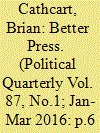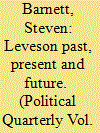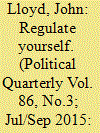|
|
|
Sort Order |
|
|
|
Items / Page
|
|
|
|
|
|
|
| Srl | Item |
| 1 |
ID:
133236


|
|
|
|
|
| Publication |
2014.
|
| Summary/Abstract |
James Margach famously argued that Prime Ministers from Lloyd George to Callaghan had been intent on exploiting the media in their determination to centralise power. From Margaret Thatcher onwards, however, there is a strong argument that the power relationship has been reversed, and that the Leveson Inquiry-set up in the wake of the phone hacking scandal-exposed a political class which had become deeply fearful of the power and influence of the national press. Citing evidence to Leveson and subsequent recommendations by the inquiry, this article presents two case studies-on data protection and on media ownership-where the public interest clearly demanded political intervention, which would be inconvenient for the major publishers. And yet, despite recommendations by Lord Justice Leveson and despite clear support from leading politicians of all parties, there has been virtually no policy progress in either case. While the Leveson Inquiry was billed as a watershed in press-politician relations and an opportunity to counteract decades of unhealthy press power, political inertia in these two areas suggests that very little has changed.
|
|
|
|
|
|
|
|
|
|
|
|
|
|
|
|
| 2 |
ID:
144825


|
|
|
|
|
| Summary/Abstract |
Writing recently in The Political Quarterly, the journalist John Lloyd took issue with regulatory remedies for ‘bad journalism’ in the United Kingdom that were proposed by the Leveson inquiry of 2011–12 and endorsed by Parliament in 2013 in the form of a Royal Charter. State action will fail, he asserted, because only journalists can change journalism, and he urged British journalists to undertake this transformation. This response argues that Lloyd dismisses the Leveson process too lightly and takes too little account of the many victims of press abuses, who are entitled to better protection. A decent society had to do something about this, and the Leveson Charter process was a measured and constructive response that offers the best hope of higher press standards and of protection for ordinary citizens while safeguarding freedom of expression for journalists. Lloyd's proposal for action by journalists, by contrast, is impractical, not least because it ignores powerful forces preventing journalists from taking control.
|
|
|
|
|
|
|
|
|
|
|
|
|
|
|
|
| 3 |
ID:
123772


|
|
|
|
|
| Publication |
2013.
|
| Summary/Abstract |
As a result of the phone-hacking scandal and evidence of other serious journalistic abuses by some newspapers, the government set up the Leveson Inquiry to hear evidence from victims and to make recommendations for a new and effective system of press regulation. Leveson's recommendations for independent self-regulation overseen by a "recogniser" was seen as a moderate solution which would uphold the principle of an unfettered press while providing appropriate protection from unscrupulous or unethical press behaviour. After historic cross-party agreement, Parliament passed a resolution accepting a Royal Charter which adopted the great majority of his recommendations. In response, Britain's main national newspapers have pursued a campaign of systematic misinformation and distortion, aimed at discrediting the inquiry, its supporters and the cross-party Charter, while promoting a different system which would remain almost wholly controlled by the industry and would in practice be little different from the discredited Press Complaints Commission. After decades of ineffectual political response to press abuse and press power, there is now a historic opportunity for Parliament to assert its sovereign power. Over the next 12-18 months, we will see whether we have reached a genuine milestone in British public life or whether the British press will remain the last bastion of unaccountable power.
|
|
|
|
|
|
|
|
|
|
|
|
|
|
|
|
| 4 |
ID:
140856


|
|
|
|
|
| Summary/Abstract |
The Leveson Inquiry recommended that a new press regulator be created, with a statutory backing—which the government and opposition agreed should be a Royal Charter. Presently, a Press Recognition Panel, backed by the Charter, has been created, but has attracted no requests for recognition. Only one regulator has been set up—IPSO: it has a membership of most of the newspaper and magazine groups in the UK, but will not ask for recognition, since it does not wish to have any formal link with the state. Though the campaign against the Royal Charter has been grossly overblown, the press is right to refuse to join an institution which is guaranteed by the state. State-backed regulation, in any form, will not in the UK lead to tyranny, censorship or any more than occasional meddling. But a link to the state is a bad idea for an independent press. Not only does this set a bad precedent, opening up a temptation for behind-the-scenes pressure, but more importantly it misses the point. Bad and abusive journalism is not improved by regulation. It is improved by journalists understanding the main task of journalism is to report and analyse accurately and neutrally. This complements robust debate and opinion and contributes greatly to a well-informed citizenry.
|
|
|
|
|
|
|
|
|
|
|
|
|
|
|
|
|
|
|
|
|